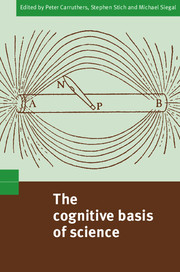Book contents
- Frontmatter
- Contents
- List of contributors
- Preface
- 1 Introduction: what makes science possible?
- Part one Science and innateness
- Part two Science and cognition
- 5 Science without grammar: scientific reasoning in severe agrammatic aphasia
- 6 Causal maps and Bayes nets: a cognitive and computational account of theory-formation
- 7 The cognitive basis of model-based reasoning in science
- 8 Understanding the role of cognition in science: the Science as Category framework
- 9 Theorizing is important, and collateral information constrains how well it is done
- 10 The influence of prior belief on scientific thinking
- 11 Thinking about causality: pragmatic, social and scientific rationality
- Part three Science and motivation
- Part four Science and the social
- References
- Author index
- Subject index
11 - Thinking about causality: pragmatic, social and scientific rationality
Published online by Cambridge University Press: 23 November 2009
- Frontmatter
- Contents
- List of contributors
- Preface
- 1 Introduction: what makes science possible?
- Part one Science and innateness
- Part two Science and cognition
- 5 Science without grammar: scientific reasoning in severe agrammatic aphasia
- 6 Causal maps and Bayes nets: a cognitive and computational account of theory-formation
- 7 The cognitive basis of model-based reasoning in science
- 8 Understanding the role of cognition in science: the Science as Category framework
- 9 Theorizing is important, and collateral information constrains how well it is done
- 10 The influence of prior belief on scientific thinking
- 11 Thinking about causality: pragmatic, social and scientific rationality
- Part three Science and motivation
- Part four Science and the social
- References
- Author index
- Subject index
Summary
While one can argue that full rationality is the adequate normative framework to evaluate the reasoning of homo scientificus, as science should spare no effort to validate causal hypotheses and to identify correct explanations, I shall argue that ordinary causal reasoning does in fact have other goals – particularly those of cognitive economy and social co-ordination. This translates into a concern with bounded rationality – using heuristics that are simple but smart; and social rationality – using assumptions about conversation which enable speakers and listeners to co-ordinate their efforts around the most relevant explanation. Understanding such concerns can help explain why homo pragmaticus deviates from scientific criteria for causal reasoning while being rational in his or her own terms. It can also help us understand what we need to do to help people reason ‘scientifically’ about causes, where we consider that to be important. Indeed, understanding the pragmatic rationality of human inference processes should help us better understand why they are ‘sticky’, and sometimes resist reformation into ‘fully rational’ modes of thinking which are principally adapted to doing science. I apply this pragmatic analysis to three domains of causal judgement: learning of causal relations; causal hypothesis testing; and discounting vs. backgrounding of causes in explanations.
Introduction
In this chapter I will be primarily interested in how scientific rationality may differ from pragmatic and social rationality with respect to causal thinking.
Information
- Type
- Chapter
- Information
- The Cognitive Basis of Science , pp. 211 - 232Publisher: Cambridge University PressPrint publication year: 2002
Accessibility standard: Unknown
Why this information is here
This section outlines the accessibility features of this content - including support for screen readers, full keyboard navigation and high-contrast display options. This may not be relevant for you.Accessibility Information
- 3
- Cited by
